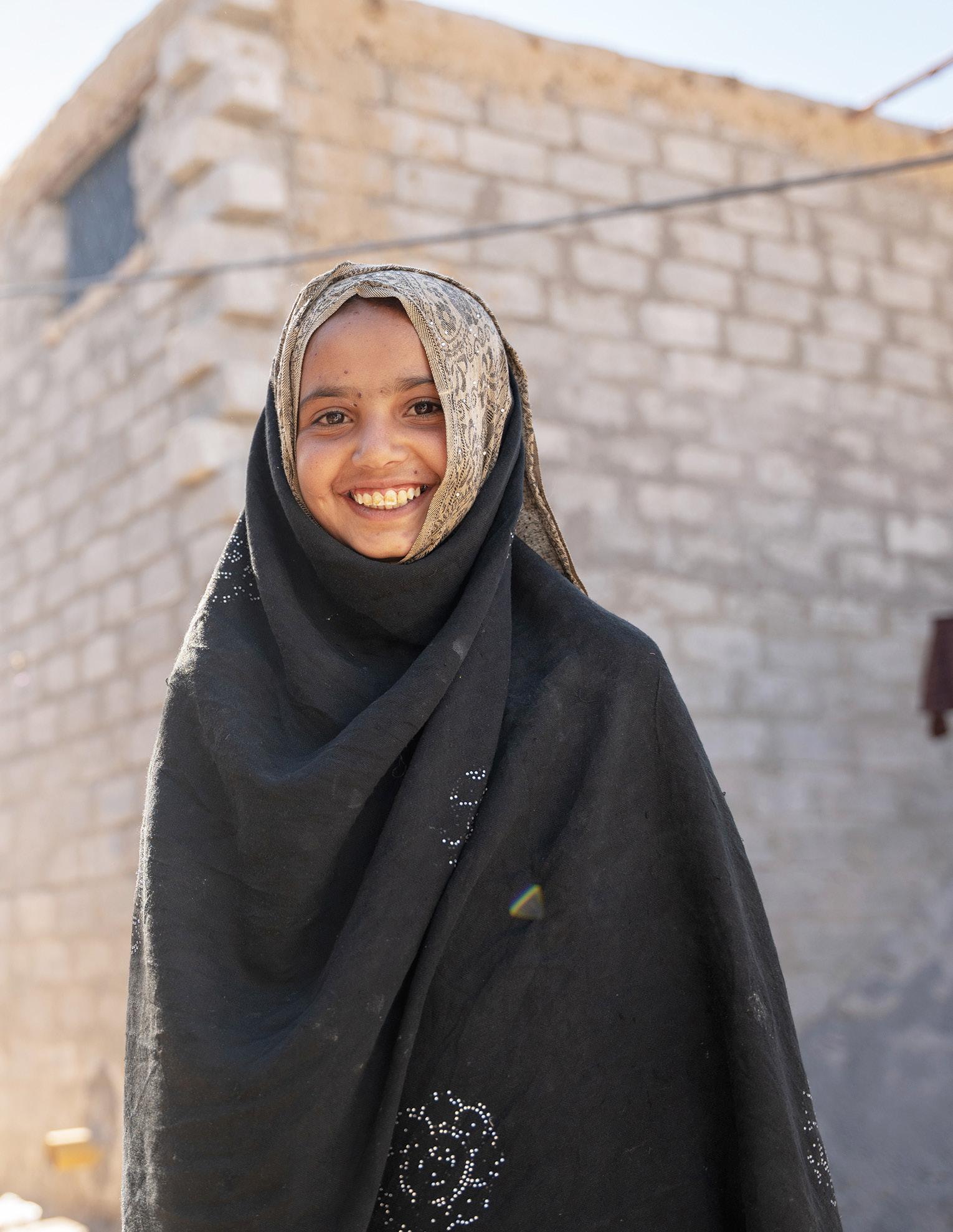




Last year Pakistan faced their worst climate disaster in a decade.
It was heartbreaking to see families weep as their ancestral homes, their place of safety and familiarity, were swept away by the unforgiving waters. And with them, the memories of generations of families were all wiped away.
But this flooding in Pakistan was not an isolated catastrophe.
Climate change continues to wreak havoc in Pakistan through changing weather patterns, drought, landslides and extreme weather events. A year later, the country is again being impacted by flooding, claiming the lives of numerous more Pakistanis.
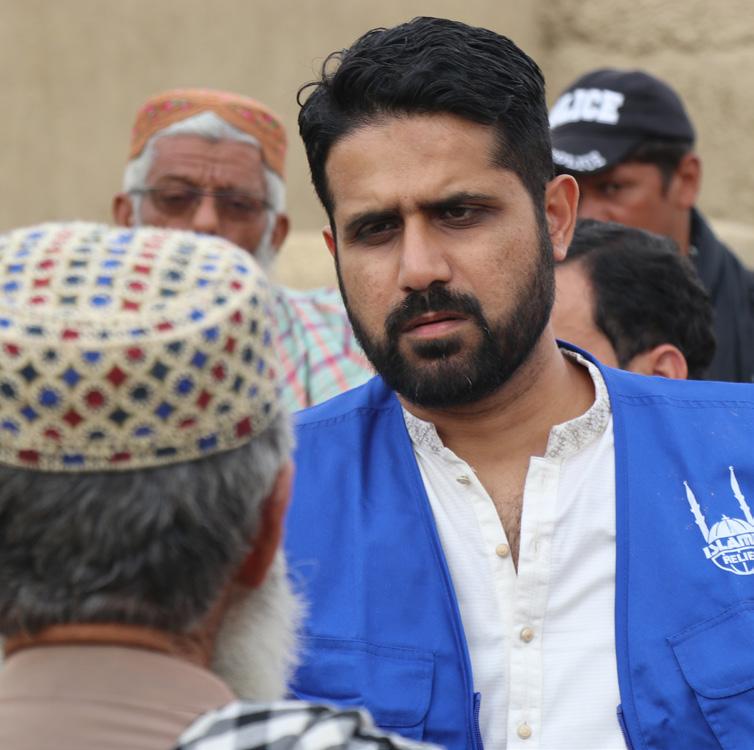
There is an urgent need to come together collectively as an international community to fight the climate crisis. Only then can we hope to create long-term solutions for the future.
Thank you for your support of our work in Pakistan thus far. I am proud to say that the projects Islamic Relief has been implementing are not limited to immediate aid but also provide sustainable solutions that enhance life permanently for the people we serve. We have installed drip irrigation where farmers can use a fraction of the water required to grow crops. We have installed flood barrier walls around villages so that in the event of flooding, the water can bypass the village.
Prevention is always better than the cure. Our teams ensure that wherever feasible, we make communities resilient to withstand natural disasters. And we can only do this, if we do it together!
Usama Khan Chief Executive Officer Islamic Relief Canada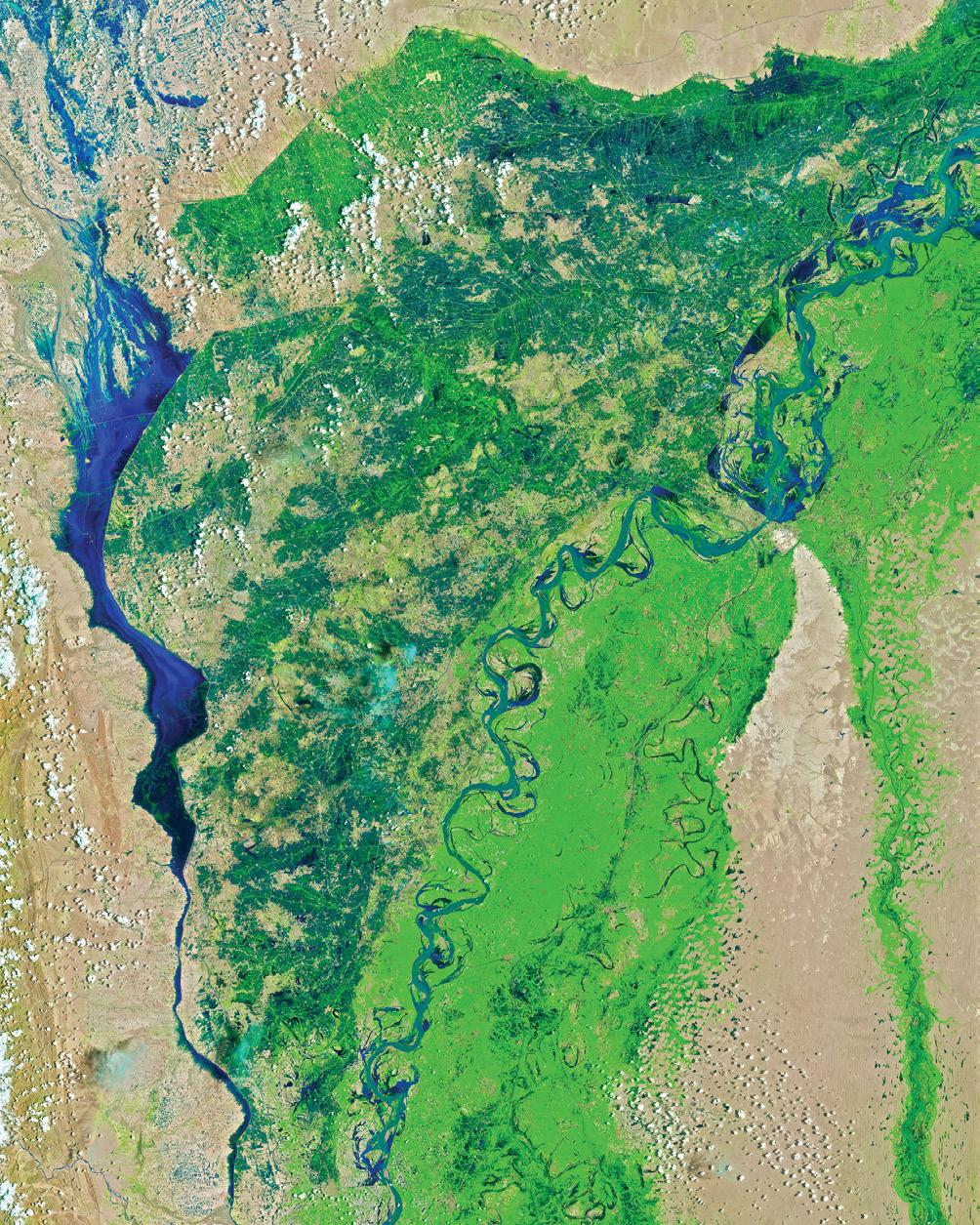
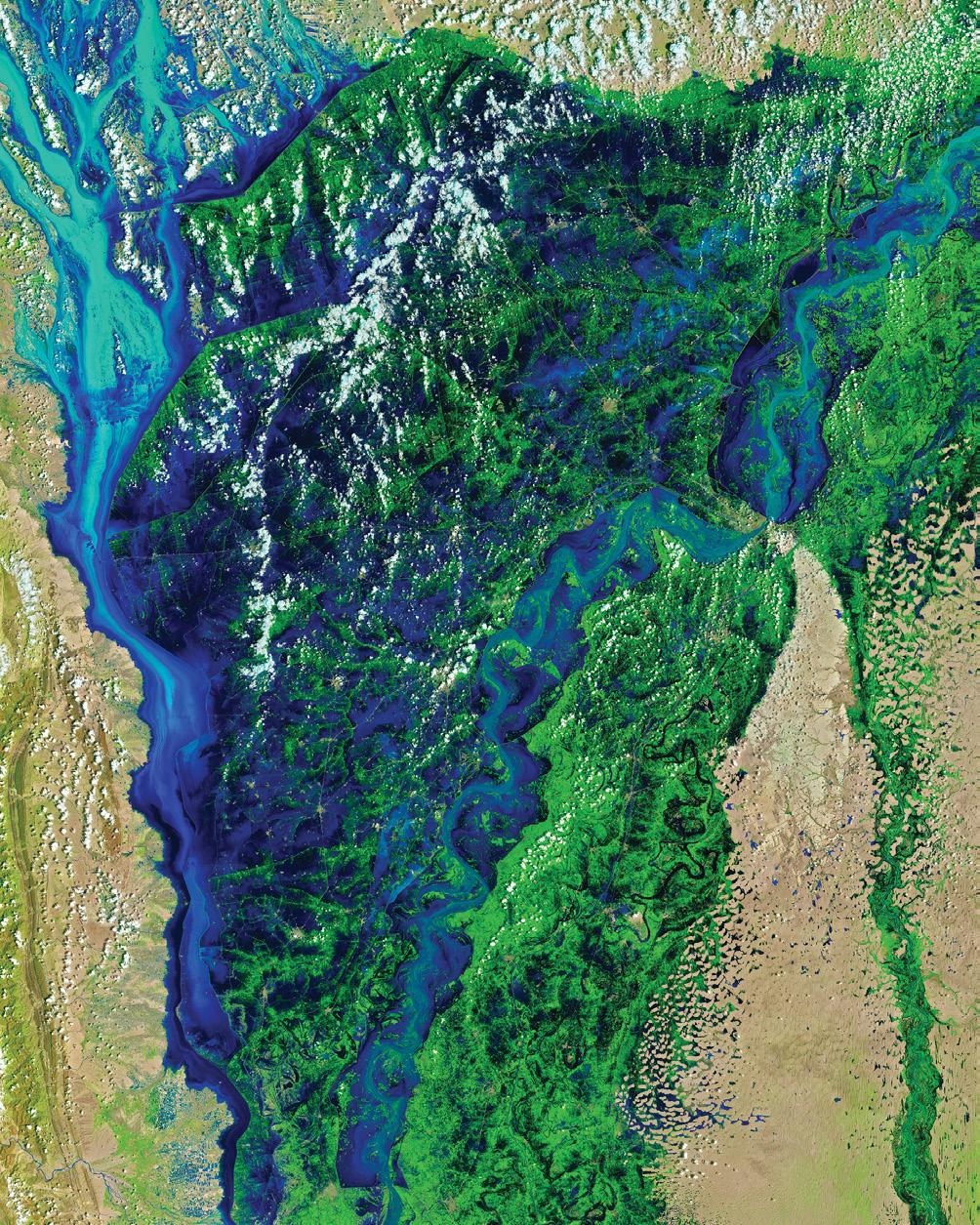
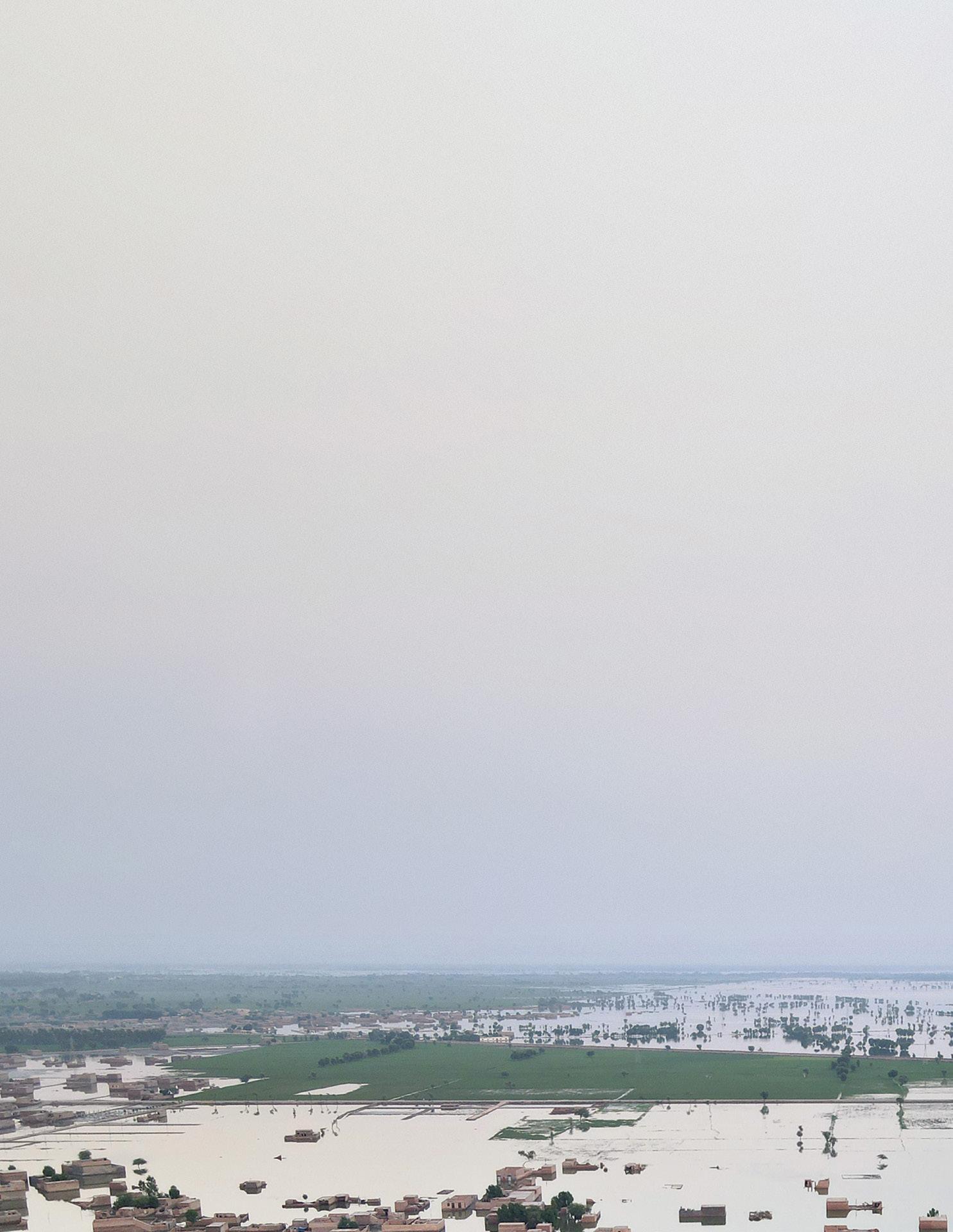 NASA Earth Observatory satellite picture from 4 August 2022
NASA Earth Observatory satellite picture from 4 August 2022
In the summer of 2022, unprecedented floods in Pakistan affected 33 million people across Sindh, Balochistan, Khyber Pakhtunkhwa, and South Punjab. Record rainfall submerged one third of the entire country, displacing 8 million people, destroying vital infrastructure, and amounting to $30 billion USD in damages. This report details the impact of the floods on the country as well as on those who are most vulnerable.

Through the support of donors worldwide, Islamic Relief took swift action to provide essential aid to 1.4 million individuals in Sindh, Balochistan, Khyber Pakhtunkhwa, and South Punjab. Islamic Relief Pakistan’s strategy involves the four Rs: relief, recovery, resilience , and research .
Relief aims to address short term needs while recovery rebuilds communities and infrastructure. Resilience addresses vulnerable areas, introducing a customized approach to disaster risk reduction and climate adaptation programs. Islamic Relief continues to conduct research in order to build more robust programs and address climate action.
Together, these phases are providing 16,361 food packs, 6,932 robust family tents and other temporary shelters, 12,379 hygiene kits, 48,000 litres of water via water trucks, 3,631 water tanks, 23,545 cash grants, 1,395 pit latrines, 9,889 hand washing stations, 6,631 health and hygiene education sessions, and 6 temporary learning centres for children.
Those benefiting have included 686,111 women and girls — 49% of the 1.4 million total — and 5,653 persons with disabilities. At the end of June 2023, Islamic Relief was listed as the seventhlargest contributor to the UN’s appeal for this year so far, committing $8.3 million USD.
Islamic Relief conducted post-flood community based research to understand immediate and long term implications for hardest-hit areas. Common themes of urban migration, gendered impact on women and girls, and feelings of exclusion from climate action emerged from local communities.
Working alongside these communities, we identified key priorities. They are as follows:
• Safeguarding indigenous knowledge and ecosystems
• Inclusive decision-making at community and institutional levels
• Training, adaptation projects, and emergency response for awareness and resilience
• Disaster risk training for youth volunteers
• Assessments of local vulnerability and capacities
• Resilient projects driven by local needs
• Technology driven improvements for food security and water services
• Maternal and child nutrition in government-designated disaster areas
These key findings are being incorporated into ongoing and future projects in the country to continue and improve community-led action and prioritize their needs.
This report details our relief efforts, recovery operations, and ongoing initiatives to bolster community resilience against the shifting climate.
“The Pakistani people are facing a monsoon on steroids: the relentless impact of epochal levels of rain and flooding. Millions are homeless. Schools and health facilities have been destroyed. Livelihoods are shattered, critical infrastructure wiped out, and people’s hopes and dreams have been washed away.”
– Antonio Guterres, UN Secretary-General, August 2022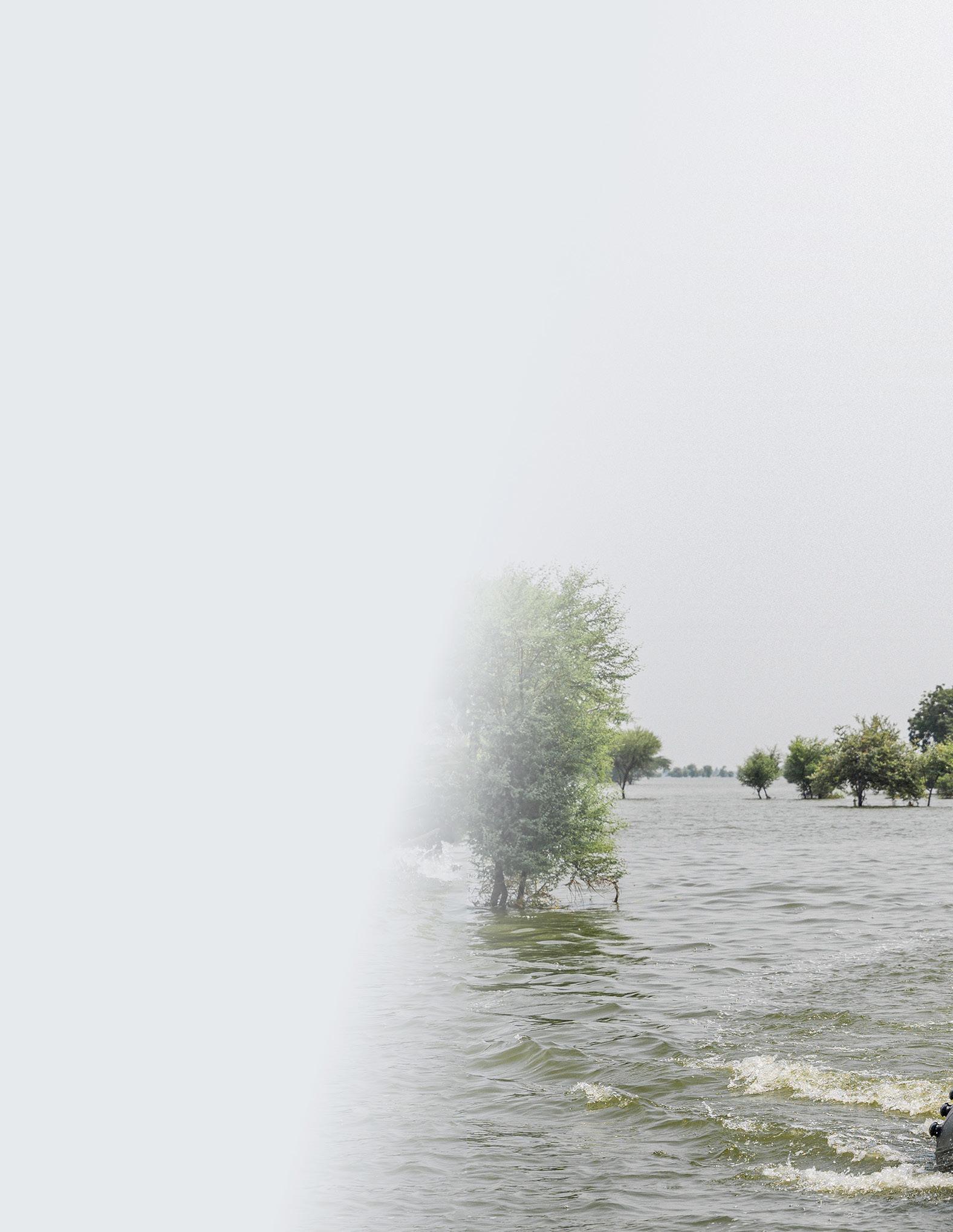
In June-August 2022, heavy rains led to unprecedented floods in Pakistan, affecting 33 million across Sindh, Balochistan, Khyber Pakhtunkhwa, and South Punjab. Record rainfall caused 1,739 deaths and displaced 8 million, devastating homes and lives.
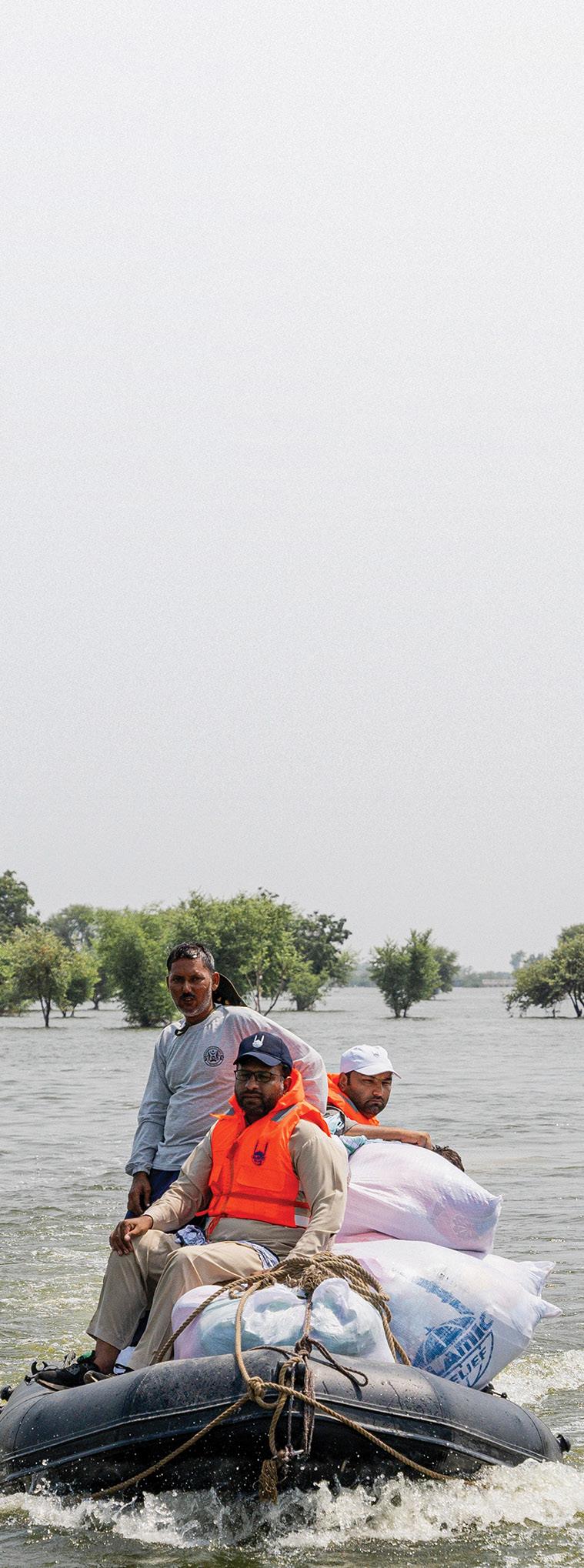
A Post Disaster Needs Assessment indicated over $30 billion USD in economic and infrastructure losses. Sindh bore the brunt of this loss, with over 1.7 million hectares of farmland damaged, loss of 800,000 livestock, and 1.6 million houses and 3,500 km of roads destroyed.
Poverty worsened post-flood, affecting 6 million due to income loss, crop damage, asset loss, and soaring food prices. Temporary shelters, contaminated water, and limited sanitation exacerbated poor nutrition and led to diseases like diarrhea, malaria, and dengue. Health facilities suffered, impeding treatment and vaccination schedules, elevating risks of diseases like measles and diphtheria.
Families across Pakistan still live in poorly constructed shelters and makeshift accommodations a year after the floods — although some at least have robust family tents provided by Islamic Relief.
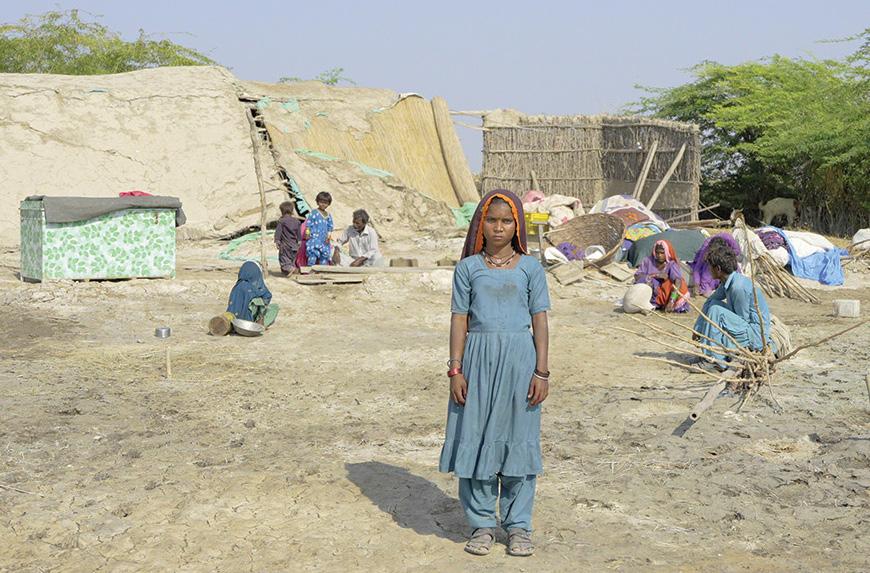
Karma Bibi (above) and her extended family were forced to flee for their lives when the floods reached their home district of Mirpur Khas in Sindh. All of their livestock were killed, and the picture shows what was left of their house when the flood waters subsided, and they were able to return — just a few remnants.
“We are thankful to Islamic Relief that they gave us a temporary shelter [tent] which will keep us safe from the extreme heat and rain until our home is rebuilt,” Karma says. “Our whole family can live in the shelter. It’s better than nothing.”
One couple that Islamic Relief met and supported, Bilal and Bushra, built a temporary shelter on the same site where their house — completely destroyed by the floods — had stood. Due to a lack of funds, they were forced to use basic materials unlikely to withstand further shocks. Their temporary shelter lacks a kitchen or bathroom, which makes sanitation and hygiene a significant challenge for the family.
This is especially pertinent as Bushra gave birth to a baby boy during the floods. She went to the hospital for the birth and had to pay for treatment before returning to the camp. “I suffered a lot,” she says. “We are poor, and it was very hard to afford essentials in an already devastating situation.”
So many families recall being caught unprepared by the floods as they faced the deluge without prior warning, underlining the importance of improving early-warning systems and communications with vulnerable communities.
Women and girls are particularly vulnerable to the impacts of climate change due to cultural and socioeconomic factors. Women are often associated with the sectors most susceptible to the negative effects of climate change and environmental disaster including agriculture, livestock rearing, and craft development.
Among the 33 million people directly affected by the floods in 2022, it is estimated that there were approximately 650,000 pregnant women in urgent need of maternal services. Research shows that prolonged and intensified stresses from climate disasters raise the risk of premature births, low birth weight, and stillbirth.

The Government of Pakistan reported significant interruptions in the education sector, with all educational institutions experiencing closures. Even when schools reopen as flood waters recede, issues such as displacement and loss of household income can exacerbate already-high dropout rates, particularly for girls who are taken out of school to assist with household tasks.
As access to education is intimately connected to upward economic mobility, this gap in learning can have lasting impacts that contribute to cyclical poverty.
Pregnant and breastfeeding women are particularly vulnerable when driven from their homes by climate-related extreme weather events like the 2022 floods in Pakistan. Research shows that the prolonged stress they experience can increase the risk of premature birth, low birth weight and stillbirth.
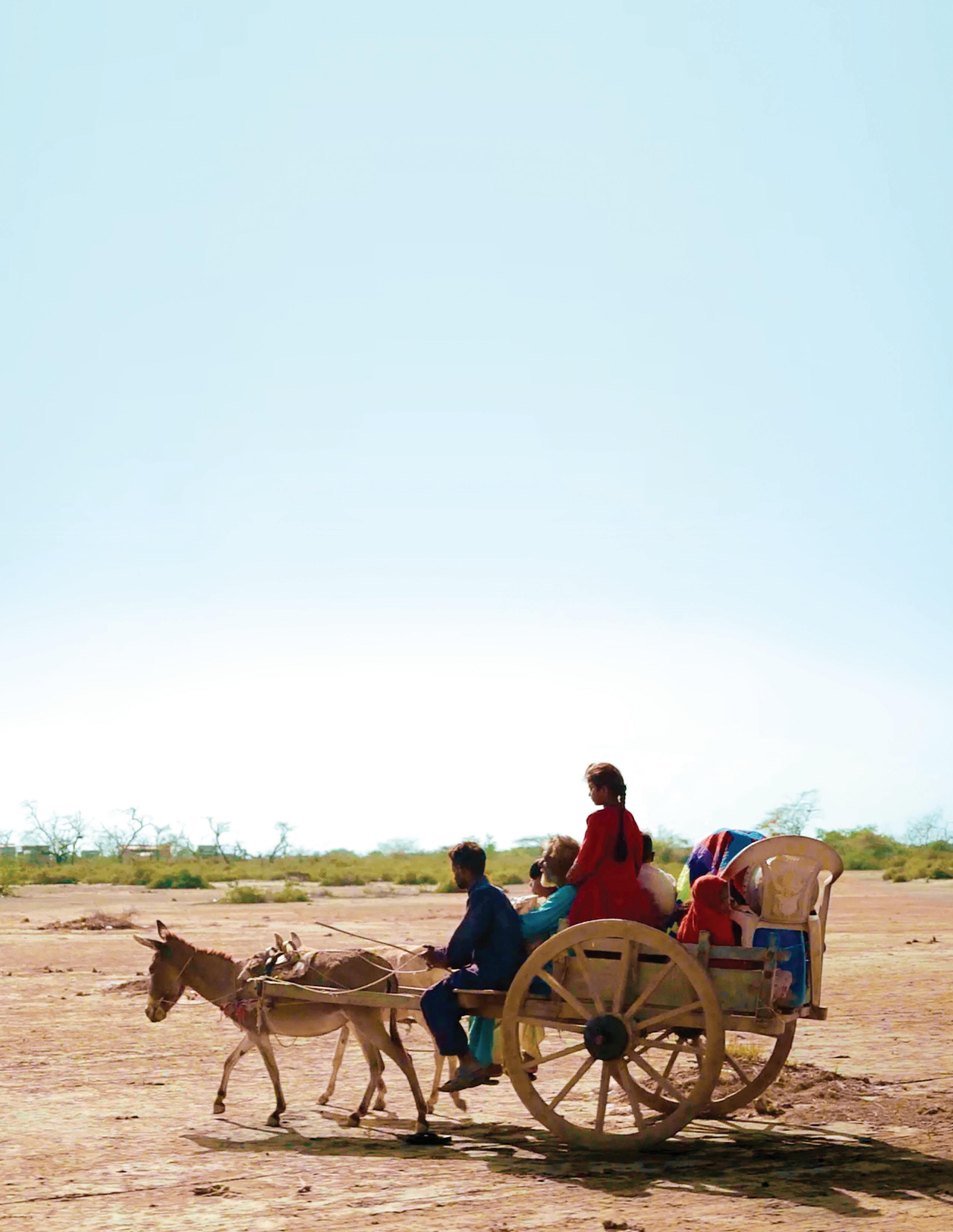
Asma is a mother of three boys who lives in the rural district of Dadu, near the banks of the Indus river. While her husband works in the city, Asma single-handedly takes care of the household. Since the floods, she and her children have been living in a tent without proper kitchen or bathroom facilities, on the land where her fourbedroom house once stood.
Speaking to Islamic Relief, she explains the struggles she has faced as a lone parent during the floods. “It rained for almost three months, and we did not have electricity during this time,” she says. “When the rain stopped, there was water everywhere. As the water level rose, we realised it was a flood and just took our children and some goods on a boat and left our houses.
“During the flood, everyone was getting sick. My baby was about a month old and didn’t receive any vaccinations. This caused me so much anxiety. We didn’t know how we would manage and where we would live during the flood.
“We just want to live safely in our houses. Every time the floods come, our houses get destroyed and we become displaced once again. When will this nightmare end?”
Over the past year, Islamic Relief’s emergency response teams provided a lifeline through flood recovery items to more than 1.4 million people across Balochistan, Sindh, Khyber Pakhtunkhwa, and South Punjab.
MEN 135,284
BOYS 124,035
WOMEN 123,132
GIRLS 123,898
TOTAL 506,349
MEN 126,324
BOYS 116,356
WOMEN 115,989
GIRLS 115,543
TOTAL 474,212
PEOPLE WITH DISABILITIES 1,902
KHYBER PAKHTUNKHWA
PEOPLE WITH DISABILITIES 2,063
BALOCHISTAN
MEN 376,929
WOMEN 342,799
BOYS 344,957 GIRLS 343,312
TOTAL 1,407,997
PEOPLE WITH DISABILITIES 5,653
SOUTH PUNJAB
TOTAL 1,464*
SINDH
MEN 115,321
BOYS 104,566
WOMEN 103,678
GIRLS 103,871
TOTAL 427,436
PEOPLE WITH DISABILITIES 1,688
*This total is the current number of rights-holders reached in South Punjab, and is expected to increase with ongoing project activities.
Islamic Relief mounted an unprecedented relief operation as the rainfall records tumbled and floodwaters advanced. The tireless efforts of our emergency response teams over several months provided a lifeline to more than 1.4 million people across Balochistan (506,349), Sindh (427,436), Khyber Pakhtunkhwa (474,212), and South Punjab (1,464).
Those benefiting have included 686,111 women and girls — 49% of the total rights-holders reached — and 5,653 people with disabilities. At the end of June 2023, Islamic Relief was listed as the seventh-largest contributor to the UN’s appeal for this year
so far, committing $8.3 million USD.
The relief phase of our response focused heavily on the fundamentals of short-term survival, namely food, clean water, shelter and sanitation. In the past 12 months, we have provided 16,361 food packs, 6,932 robust family tents and other temporary shelters, 12,379 hygiene kits, and clean water for 550,000 people. We provided 23,545 cash grants to give the families worst affected the flexibility to prioritize their own
individual needs.
In partnership with UNICEF, we could truck in 48,000 litres of water a day to families with no access to clean water and set up 3,631 water tanks for displaced people. We installed 1,395 pit latrines and 9,889 hand-washing stations to help reduce the spread of deadly diseases such as severe diarrhoea, typhoid, mosquito-borne malaria, and dengue fever. We backed this up with 6,631 health and hygiene education sessions to keep people safe and also set up six temporary learning centres for children who had been missing out on their schooling.
As communities tackle the enormous task of rebuilding, the recovery phase of our operation has so far provided 6,420 permanent shelters for displaced families and helped others to rebuild their homes themselves. In partnership with the United Nations Development Programme (UNDP) we launched a cashfor-work program that has enabled impoverished people in Sindh to earn an income while repairing damaged infrastructure such as homes, pathways, water pumps and irrigation channels in their villages.
Our resilience projects and climate adaptation programs are spread across all four provinces of Pakistan and the administrative territory of Azad Jammu and Kashmir. They began with an initiative to mitigate the impact of drought in Balochistan and making agriculture more sustainable in arid areas through the use of drought-resilient crops and climatesmart agricultural methods. We also worked in partnership with the provincial government of Balochistan to improve drought
At the height of the floods Islamic Relief provided thousands of tents to people living out in the open. The tents were robust, high-quality and big enough to accommodate large families and their livestock. We also provided families cut off for weeks or even months from electricity and clean water with solar lanterns and water filters.
“We lived in tents for more than two months and we did not have clean drinking water there,” says Lachmi (above and below), driven from her home by the floods in Mirpur Khas, Sindh. “Even after returning home there was no clean water because all the water sources had been contaminated.

“Islamic Relief provided us with shelters and water filters, which have been very useful. We can now have clean drinking water, and we do not even have to do much for it. Everyone was getting sick before because of drinking contaminated water but this is helping us a lot.”
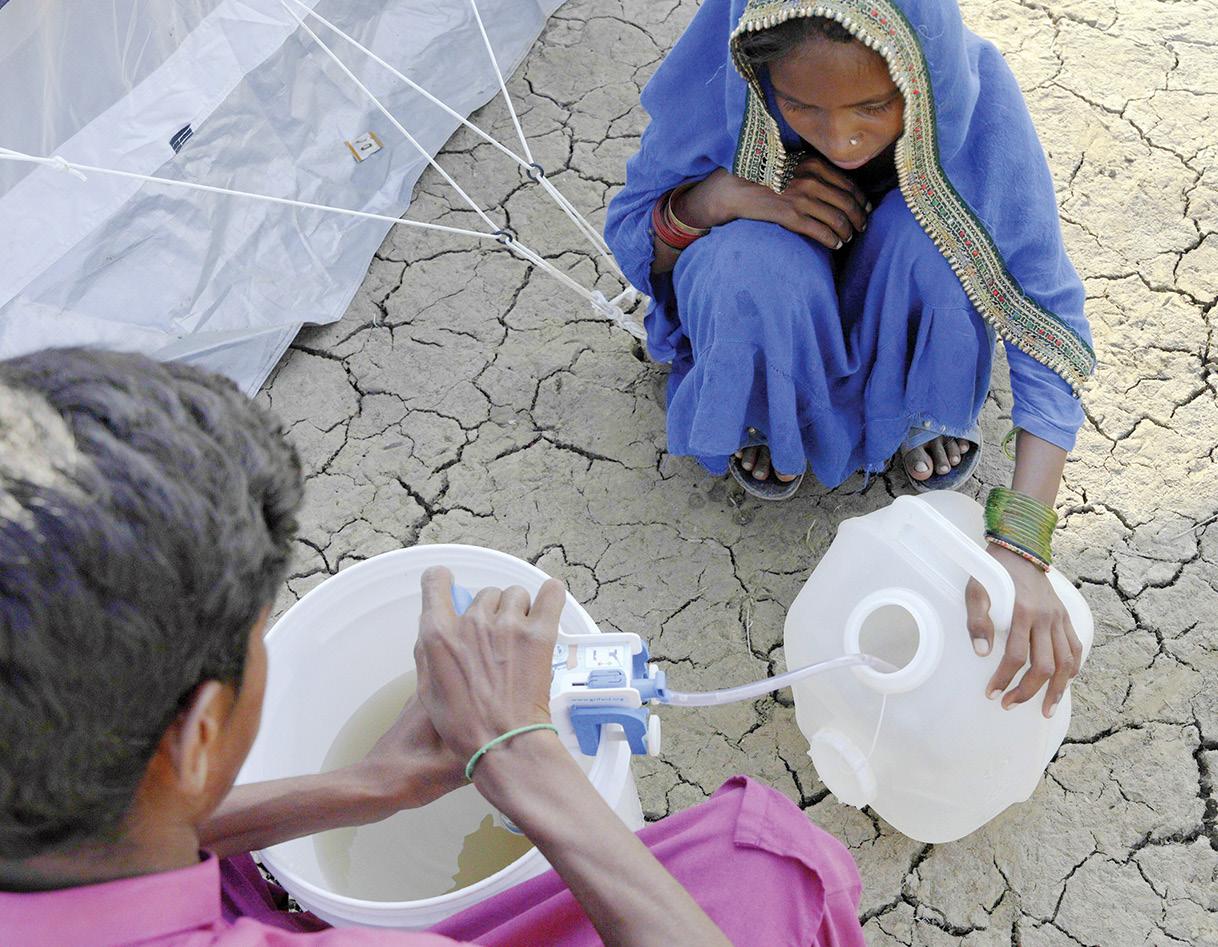
“The floods destroyed everything we had,” says 39-yearold Sher, who lives with his wife and six children in the Quetta district of Balochistan. “In the whole of my life I have never witnessed such heavy rains.”
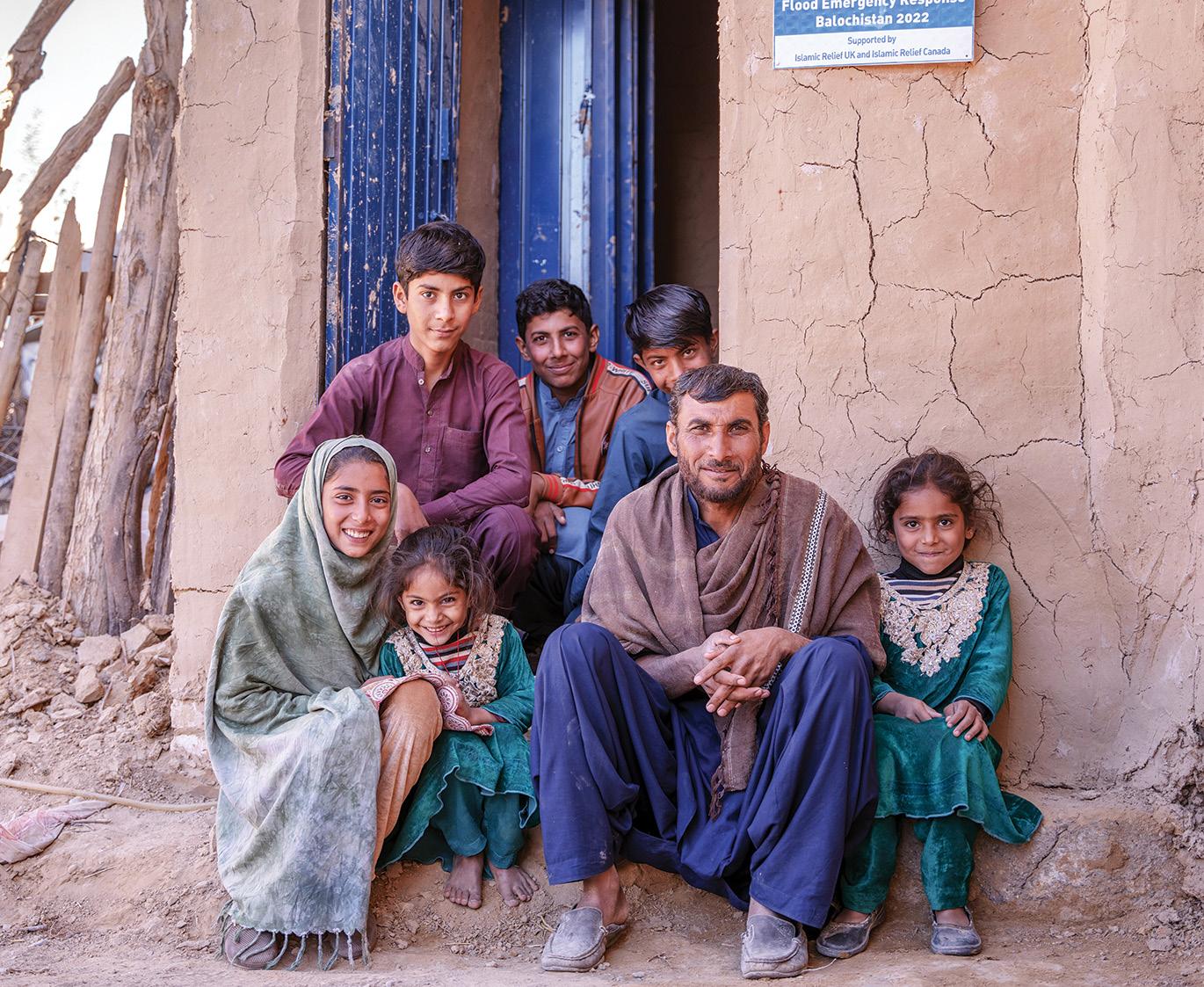
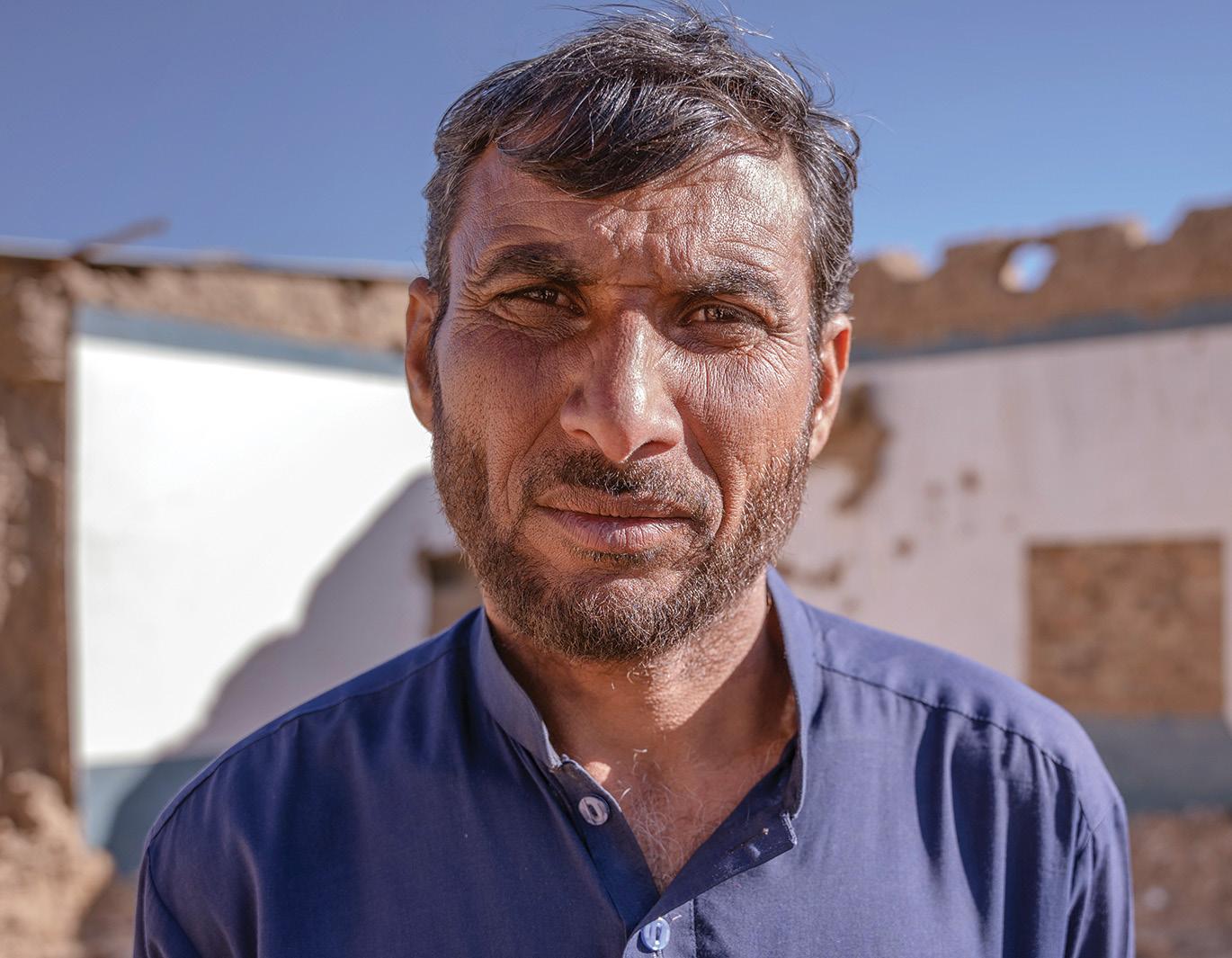
Sher’s meagre crops were wiped out, forcing him to rely on an uncertain income from casual labour to feed his family, and his former home was reduced to a shell. Islamic Relief enabled the family to rebuild their house by providing them with the materials needed — a door, window, air vent, large bamboo canes, girders and roofing material.
When we provide building materials or build new homes for people — and we had built 6,420 by midJuly 2023 during the recovery phase — our aim is to build back better by ensuring that houses are flood and earthquake resilient and meet practical and cultural requirements in terms of living spaces, a kitchen area and bathroom.
This orchard of 100 apple trees is one of a number of fruit orchards established by Islamic Relief in AJK, working in close collaboration with communities and the local government’s agriculture department under a project called Green Actions for Protecting Biodiversity (GAP).
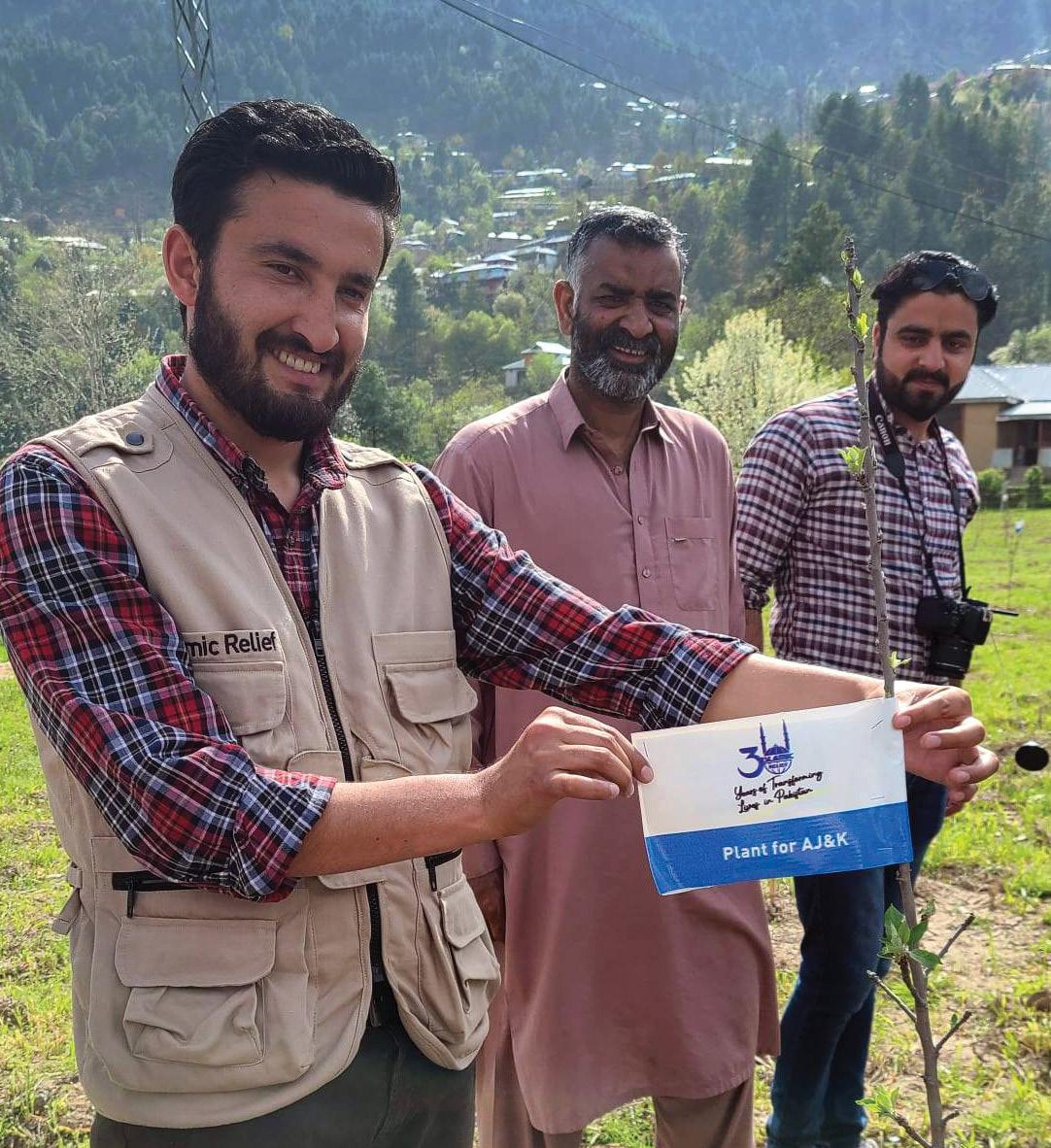
In each location we choose a fruit variety that has a strong chance of survival in the local environment and the potential to generate high yields, prioritising local indigenous varieties. In this case we and the community chose well — the orchard had a 100 per cent germination rate.
It is well known that trees and forests absorb and store carbon dioxide. When trees are felled or forests are cleared, the capacity to absorb harmful emissions is reduced, damaging the environment in the process. Forest loss resulting from deforestation and natural disasters accounts for approximately 10 per cent of global warming.
Projects like this one are good not only for the environment but also for creating sustainable livelihoods, providing healthy food and reducing the risk of people cutting down trees for fuel because they cannot make ends meet. Representatives of the agriculture department are providing training for growers, particularly women, and we are working with these communities to help them preserve and store their fruit — including learning how to make delicious chutneys and jam.
Islamic Relief’s approach is characterized by the four Rs – relief, recovery, resilience, and research. The relief phase focused on the fundamentals of short-term survival such as food, clean water, shelter, and sanitation. The recovery phase focuses on a smaller number of hard-hit communities to rebuild homes and restore vital infrastructure and livelihoods.
To incorporate resilience, we invest significantly in disaster risk reduction and climate adaptation programs. Efforts include collaborating with local communities and prioritizing the needs and ideas of women. The projects we have developed with this in mind include:
Using renewable energy technology such as solar plants and windmills to harness the power of the sun and wind and reduce reliance on fossil fuels
Planting indigenous trees and orchards featuring local drought-resilient varieties, enabling communities to combat deforestation and earn an income from fruit production
Building water storage ponds and water filtration plants and using drip irrigation technology to combat water scarcity, improve community health and keep crop cultivation and livestock farming alive
Building gabion retaining walls, metal cages filled with rocks, to protect soil and agriculture in hilly areas from destructive erosion during heavy rain or flash floods

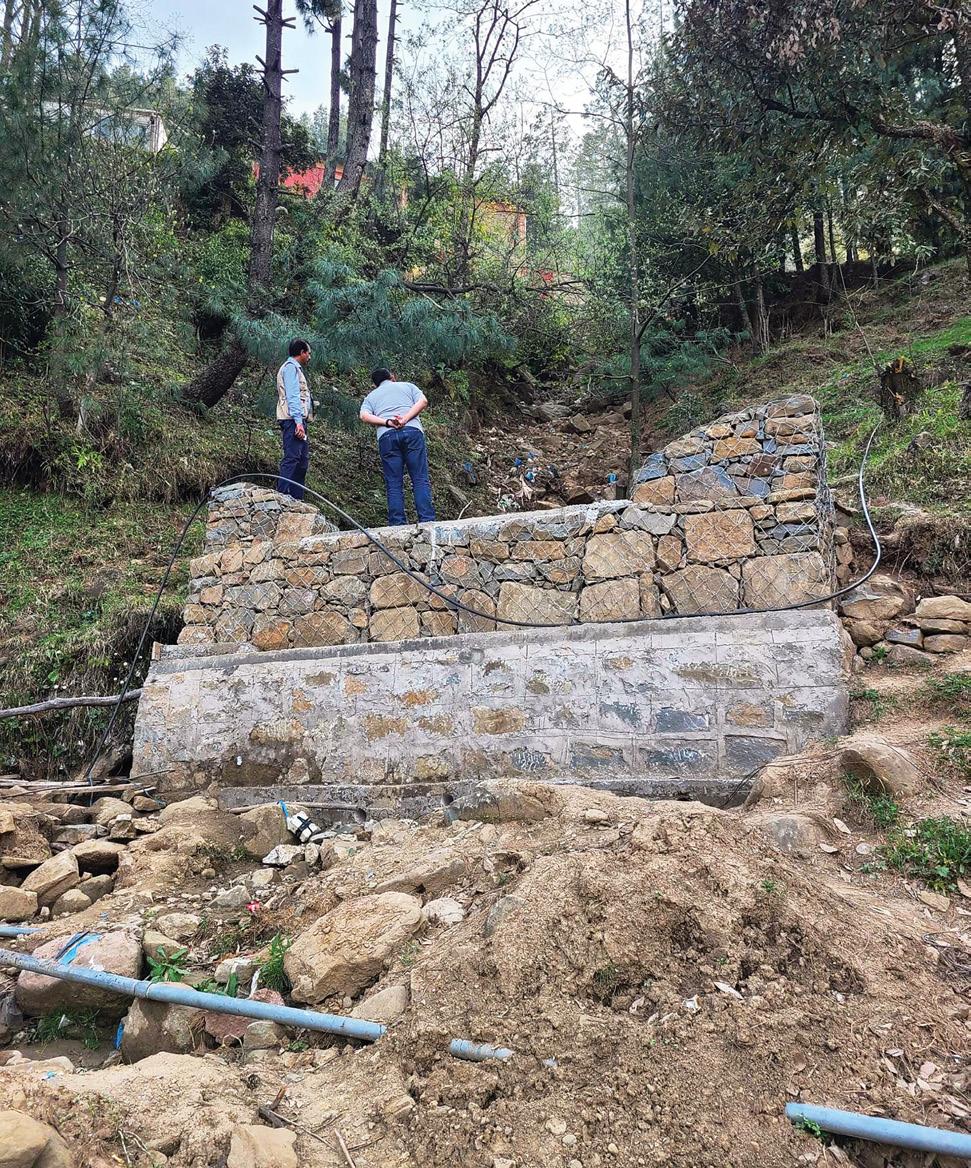
Constructing robust stone check dams to guard against landslides that can wipe out whole villages
A fusion of scientific innovation and indigenous knowledge has characterized our approach. These efforts are further strengthened by research, to capture the experience and insights of the communities served and result in the implementation of more effective and relevant programs.
In response to the devastating floods and ongoing climate crisis, Islamic Relief Canada continues to distribute emergency shelter, food, hygiene kits, household kits, tarpaulin sheets, and conditional cash grants, alongside psychosocial support and safeguarding awareness sessions through 7 projects . These projects are especially highlighted as they were funded by Islamic Relief Canada, however they are part of Islamic Relief’s total effort that has been detailed in this report.
Our previous Earthquake Recovery Response in Balochistan was expanded to deliver 155 food packs, 310 hygiene kits, and 155 waterproof tents and kitchen sets to 475 families impacted by the floods in union councils Sadar 1, Sadar 2 and MC Harnai Bazar in Noshki, Balochistan.
In the districts of Pishin, Quetta, and Noshki, the Emergency Flood Recovery Response reached a total of 38,052 individuals. Activities consisted of shelter kits, conditional cash grants and masonry training, which enabled affected families to construct or repair their damaged homes.
41,446 Rights-holders Have Been Reached
155 Food Packs 310 Hygiene Kits
155 Tents and Kitchen sets
4,460 Cash Grants
500 People Trained in Masonry
In Thata, Dadu and Mirpur Khas cities of Sindh, 2,760 families received food packs, non-food kits including household kits and tarpaulin sheets, hygiene kits and 1,000 tents while 244 families in Taunsa of South Punjab received tents via the support of the Molana Tariq Jamil Foundation.
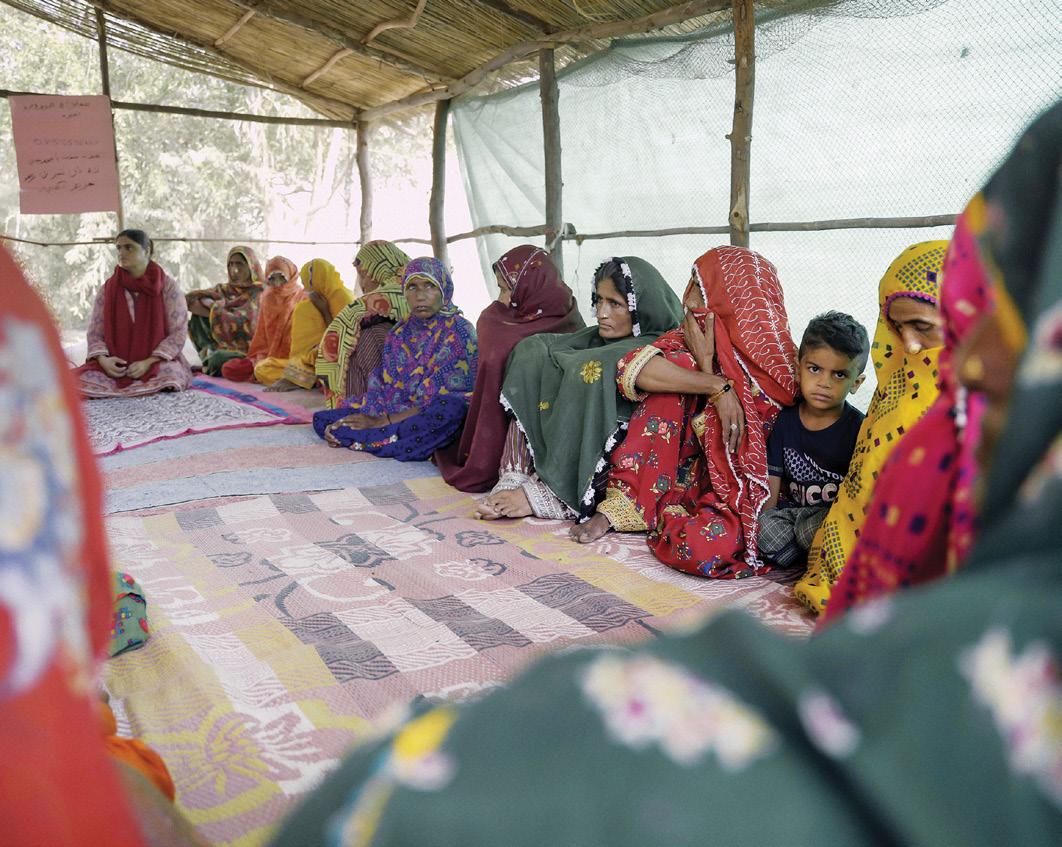

25,075 Rights-holders Have Been Reached
2,380 Tarpaulin Sheets
2,340 Hygiene Kits
2, 556 Food Packs
1,244 Tents
2,380 Household Kits
SOUTH PUNJAB MIRPUR KHAS THATTA TAUNSA DADU SINDHReaching the most vulnerable and flood-affected communities in the districts of Dadu and Mirpur Khas of Sindh and Quetta district of Balochistan, 3,380 families are receiving household kits, kitchen sets, newborn kits, hygiene kits and water purification tablets, and cash grants of 50,000 PKR. 600 hygiene promotion sessions are also being conducted to raise awareness on best practices for menstrual hygiene management.
The new post-flood development project in Dadu of Sindh province and districts Sohbatpur and Usta-Muhammad of Balochistan is providing 26 businesses with grants and skills training, building 200 disability-inclusive shelters, rehabilitating water points, distributing 1,950 water storage kits as well as conducting hygiene awareness campaigns. Disaster risk reduction teams have been assembled to support this project, aiming to reach 132,220 individuals.
155,880
4,670 Household Kits
4,070 Kitchen Sets
1,300 Newborn Kits
6 Community Safe Spaces
3,170 Cash Grants valued at $298

CAD (50,000 PKR)
255 Assistive Devices for People with Disabilities
2,340 Hygiene Kits and Water Purification Tablets
8,317 Provisions of Psychosocial Support
618 Hygiene Awareness Sessions
Rights-holders Will be Reached Upon Completion of ProjectsSOHBATPUR QUETTA USTA-MUHAMMAD MIRPUR KHAS
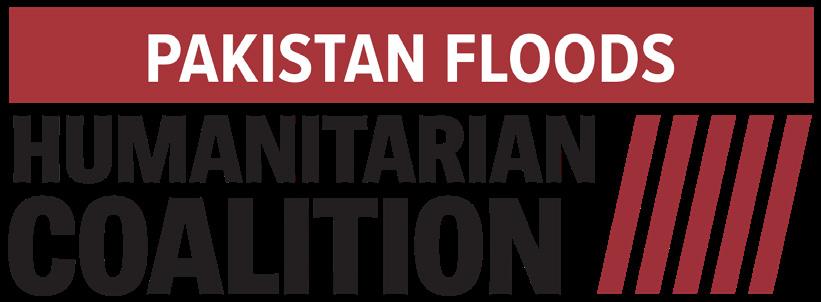
As part of the Humanitarian Coalition, donations made to Islamic Relief Canada between August 1 to September 28, 2022, were matched by the Government of Canada to reach 10,553 families in the DI Khan and Tank districts of Khyber Pakhtunkhwa.
4,635 families received cash grants of $316 CAD (50,000 PKR) over the course of 2 months, while 845 pregnant and lactating women and 155 elderly men are receiving nutritional supplements and meal replacements. 9,000 women and girls are receiving menstrual hygiene kits, 200 assistive devices have been distributed to persons with disabilities, and groupbased psychosocial support and awareness sessions for 1,024 individuals have been implemented to address protection concerns. As well, awareness raising on safeguarding and complaint mechanisms was done for 2,998 households.
80,064
Have Been Reached
1,000 Nutritional Supplements
2 Women and Child Safe Spaces
10,553 Dignity Kits
200 Assistive Devices
20 Psychosocial Support Groups
4,635 Cash Grants valued at $316 CAD (50,000 PKR)
KHYBER PAKHTUNKHWA DI KHAN TANK“We have lost our work as farmers because of these floods. Our landlord decided to sell his land because he did not have enough resources to carry on with agricultural activities with accumulated debts. With our entire family out of work, my elder brother moved to Karachi to work there and support us. The rest of us are roaming the villages in search of work as farm labourers, as these are our skills which are quickly losing value.”
– Shazia, unemployed farm labourer in SindhIslamic Relief believes that the humanitarian response to disasters should be shaped by the voices of the communities directly affected to ensure that needs are met appropriately and adequately. In the year since the floods, we have listened to these voices through a series of research projects.
Through research projects, Islamic Relief identified a number of common themes and concerns expressed by local communities:
• The effects of climate change on the environment make life even more precarious for poor communities.
• Climate change is a significant push factor for urban migration. Many families previously engaged in agriculture are now dependent on wage labour in towns and cities, leading to growing food insecurity, decreased selfsufficiency, and a loss of valuable skills.
• Climate injustice, Pakistan’s post-colonial legacy and the lack of international funding for adaptation, loss, and damage are significant barriers to progress on climate action.

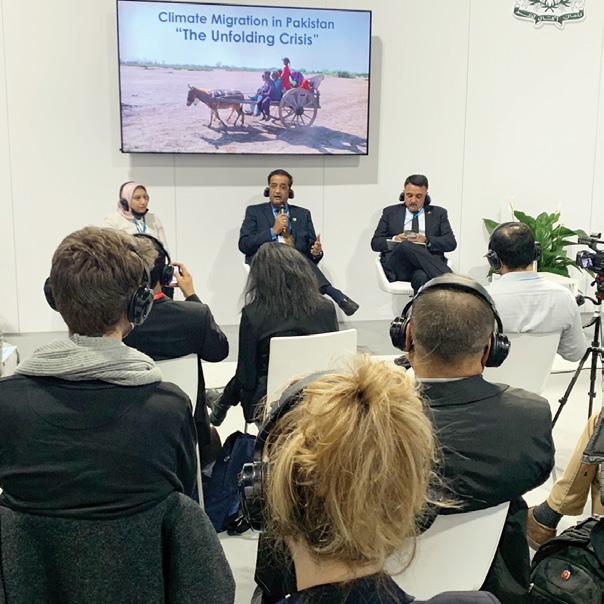
• Local communities feel marginalized and excluded by climate action and responses.
These themes are explored further in the full research reports available on the Islamic Relief Pakistan and Islamic Relief Canada websites, with some key findings summarized in the following sections.
Coastal communities in Malir and Thatta are among the most vulnerable to the effects of climate change. Approximately 90% of farmers and fishermen surveyed report being adversely impacted, with the reduced availability of safe water and drastic reductions in agricultural productivity resulting in food shortages and an uptick in diseases.
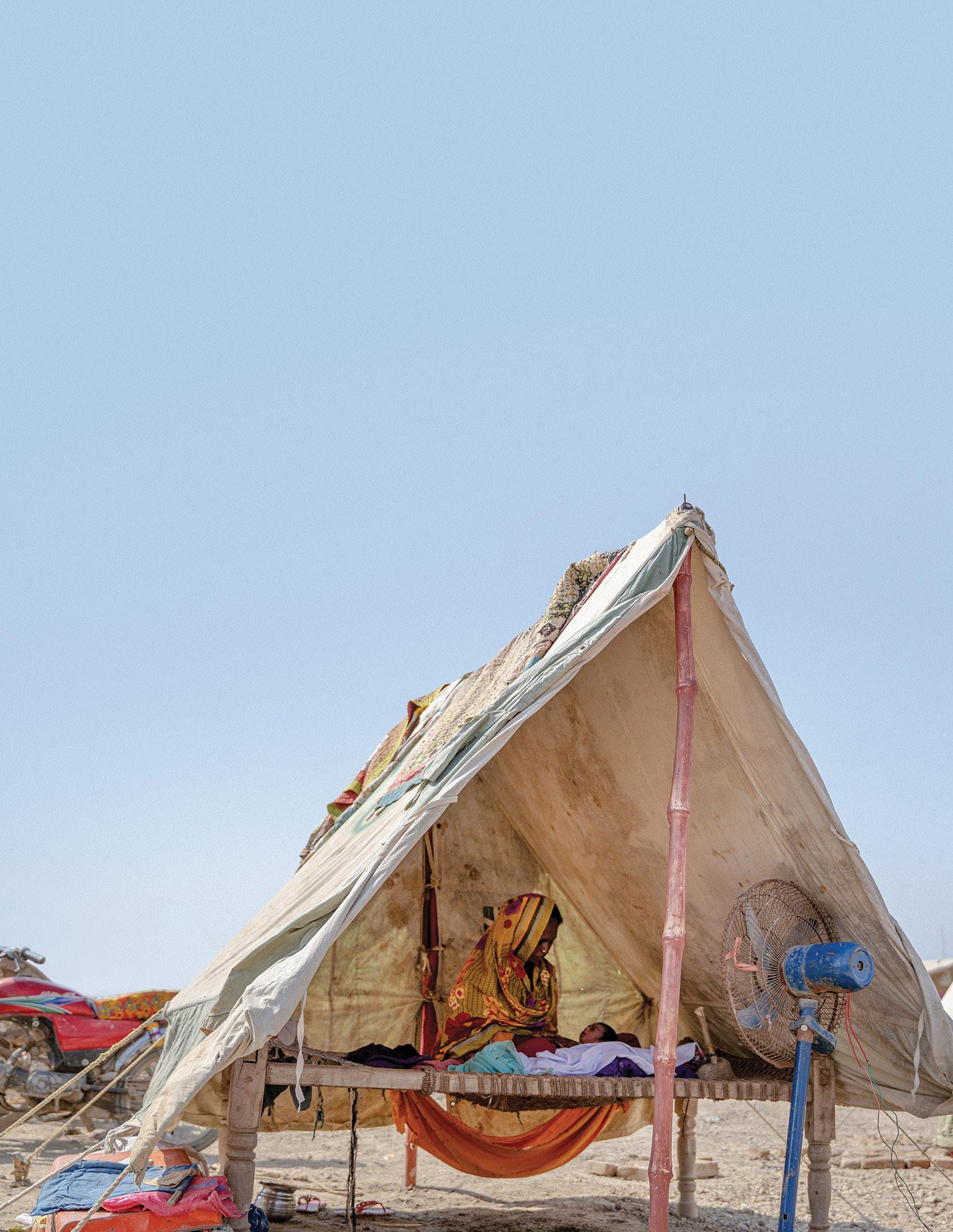
Although climate change affects everyone, its impact is not spread evenly. It is vulnerable and marginalized groups who often bear the heaviest burdens. For example, over 70% of elderly people reported adverse health effects, while children became more susceptible to seasonal diseases.
While there have been improvements in terms of awareness at the government level, there remains a lack of capacity to comprehensively plan and respond to the vulnerabilities present in the coastal communities of Sindh. Capacity building and awareness is imperative at provincial, district and village levels if these communities are to be better served.
Vulnerable communities in Balochistan, Azad Jammu Kashmir and Rawalpindi are experiencing a drastic increase in extreme weather and disaster events. This is having a serious negative impact on livelihoods because they are decimating agriculture, reducing crop yields significantly and affecting the health of livestock.
Another concern is water access and contamination, with extreme weather affecting the water supply and rapid urbanization posing a threat to already limited water resources. The shortage of safe water is a particular burden for women and girls, who are responsible for collection of water for household purposes and who also make up the majority of the workforce in the agricultural, livestock, and fishing sectors. As natural resources become scarcer, women and girls are expected to have an increased workload while facing a higher risk of falling into poverty.
Marvi was a young mother of two, pregnant with her third child when the floods reached her district of Dadu in Sindh province. Before the deluge, her husband, Bagan, earned a living as a subsistence farmer. As a result of the floods, they lived in a tent for over five months, with no source of income for the family.
Thankfully, Marvi and her family received food, water, a tent and other aid from Islamic Relief at the height of the floods. She subsequently managed to get to the hospital when her pregnancy reached full term, giving birth to a baby girl. But the family’s problems did not end there – as we learned when Islamic Relief staff visited her back in her home village one year on.
“We have been struggling because our home was destroyed,” she told us. “Everything that we had from years of savings was washed away by the floods. It’s been seven months since we came back but the situation is still the same. My daughter still does not have enough food to stay healthy, and we cannot afford health care. There is not even clean drinking water in our village. My husband works as a daily labourer now and then, earning enough for us to meet only the most essential needs.”
Marvi’s story echoes the countless families who survived the floods but continue to struggle for survival in the aftermath. Our research has highlighted the particular vulnerability of pregnant women and breastfeeding mothers when disaster strikes and the need to invest in better maternal health care.
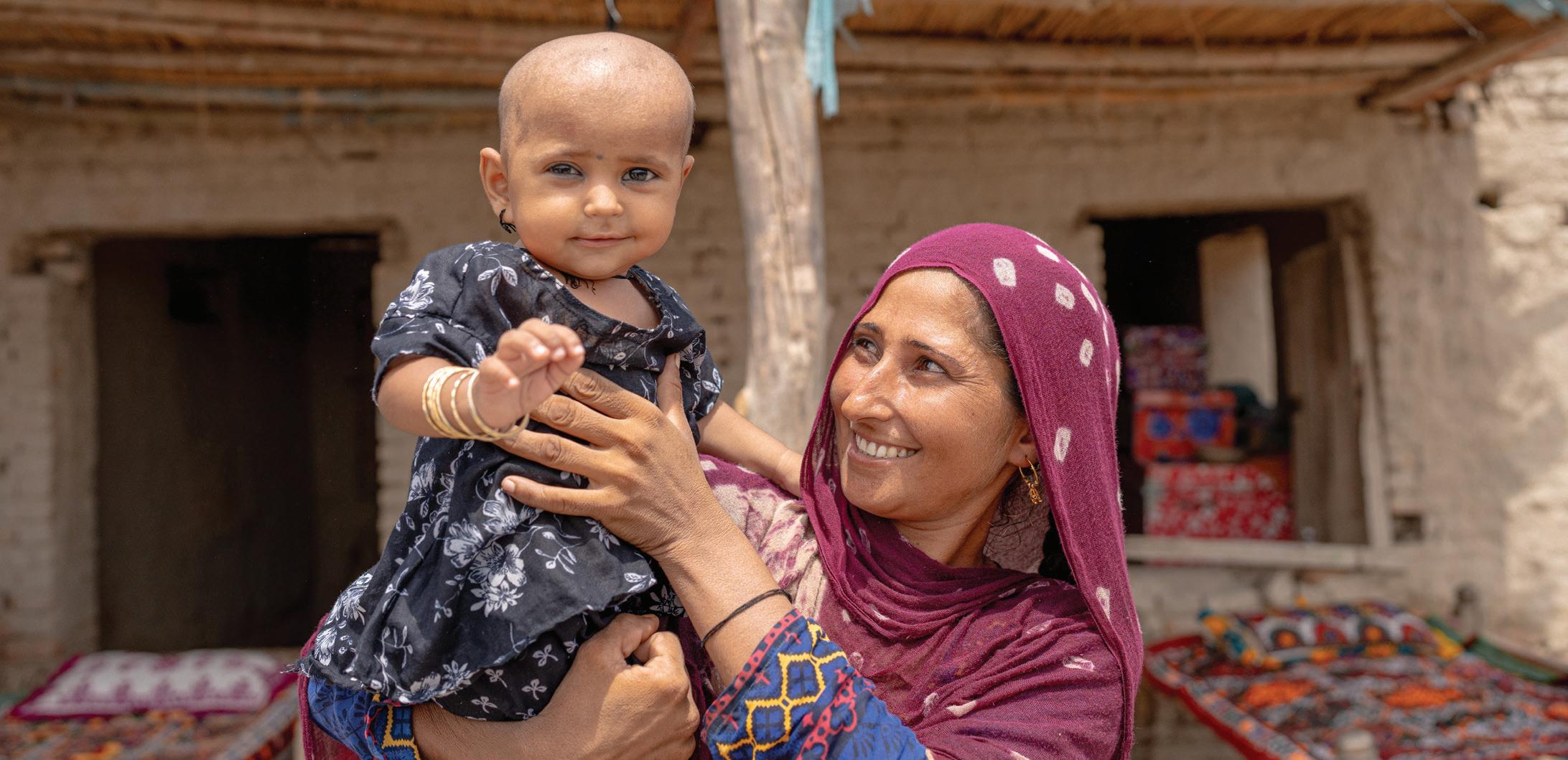
“We cannot afford even the basics for our three children,” Marvi said. “If we had some support,our children would get healthy and would not get sick so often.”
For Pakistan to have a chance of climate resilience as climate change bites, significant investment is needed in building resilient homes, infrastructure and livelihoods for families like Marvi’s — an investment that is beyond the means of aid agencies and the government without additional climate finance.
Our report finds that one of the most significant impacts of climate change on young people occurs as a result of displacement and migration, which disrupts education (43% under age of 25) and undermines livelihoods (23% under age of 25). Despite the widespread impact, young people are largely excluded from contributing meaningfully to the climate response.
Young people carry enormous potential to be agents of change. Their vitality, skills and adaptability make them ideal candidates to become mediators, community organizers, aid workers and peace brokers. It is critical that this potential is realized through informed policy measures, awareness programs, skills training, and other interventions.
Reconstruction efforts that recognize indigenous knowledge systems promote climate justice, prioritize the inclusion and protection of those most vulnerable, and oppose the exploitative use of resources provides a critical opportunity to build back better.
Throughout the detailed research we conducted, we found several areas of concern that require urgent and immediate attention:
• Creation of a new framework for protecting indigenous communities and their knowledge systems to restore ecological balance and drastically reduce the exploitative use of natural resources
• Inclusion of marginalized and vulnerable communities in decision-making and climate action, both on a community level (through neighbourhood councils, community-based adaptation teams and youth leadership forums) and on a formal institutional level
• Provision of extensive training and skills development to support communities in building awareness of climate risk and responses, developing disaster prevention strategies, managing emergency responses and building climate resilience
• A detailed, strategic assessment of climate-induced hazards and vulnerability, including local capacity assessments and an inclusive approach at local level
• Design of new projects based on climate vulnerability and capacity analysis reports prepared with the full involvement of local communities, including the promotion of crop varieties that are resistant to drought and grow in saline soils
The youth of Pakistan, usually excluded from debate and decision making about tackling poverty and climate change, often have the energy and enthusiasm needed to turn things around in their communities. Islamic Relief has provided cash grants and training for young people in KPK province to enable them to establish small businesses and build sustainable livelihoods
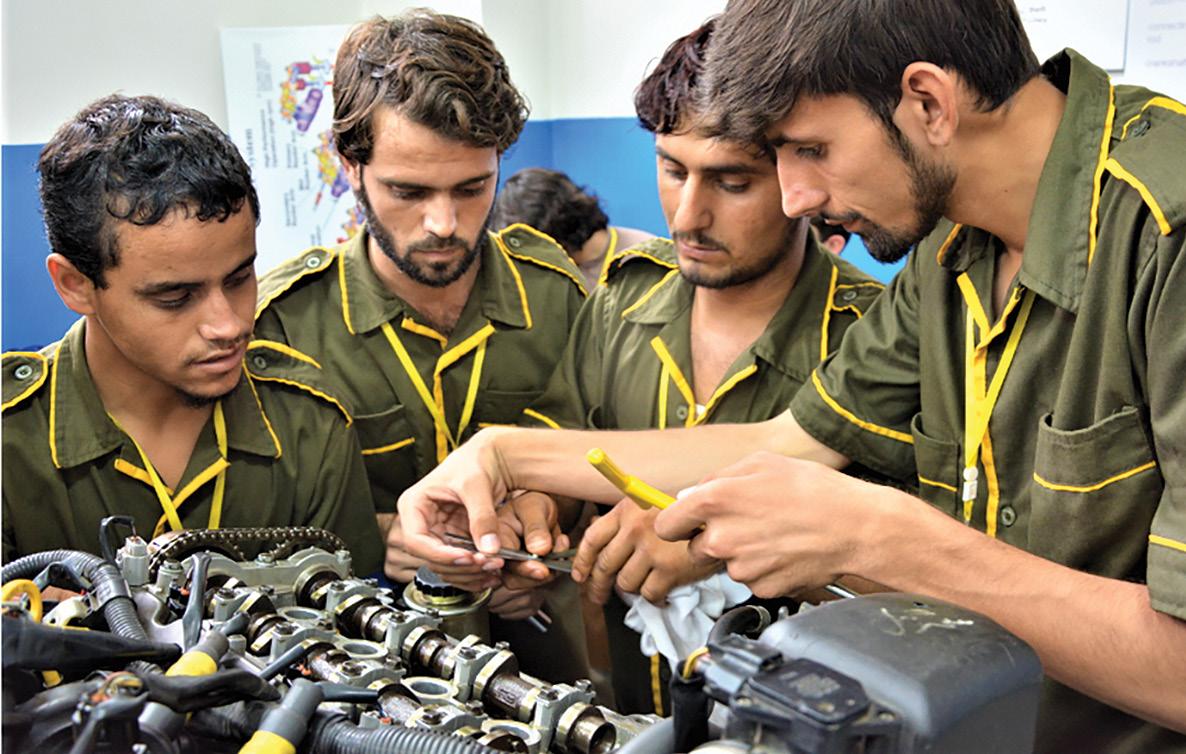
to
change, especially for the poorest,
Last year’s cataclysmic floods could hardly have come at a worse time for the Government of Pakistan. The country’s economy was already weighed down by the quadruple burden of a record 27% inflation, a spiralling trade deficit, steep debt repayments and severely depleted currency reserves.
The government’s PDNA puts the combined cost of infrastructure damage and economic losses at over $30 billion USD, projecting that an extra 8.4-9 million people could be pushed into poverty in the year ahead. The price tag for rebuilding the country was set at $16.3 billion USD.
Humanitarian aid alone can barely begin to meet a country’s needs in such shattering circumstances.
Pakistan needs all the international support it can get to foot the bill for reconstruction and rebuild better, providing stronger protection for marginalized communities and their fragile livelihoods when disaster strikes again.
Islamic Relief also believes that low-emissions, highvulnerability Pakistan has a strong claim for generous climate finance support on the polluter-pays principle. Thanks in part to Pakistan’s leadership on the issue, COP27 concluded with a landmark agreement by governments to create a specific fund for loss and damage and form a ‘transitional committee’ to make recommendations on bringing the fund into being.
Islamic Relief has put forth a number of key principles and criteria to be met in the establishment of the new Loss and Damage Fund to ensure it is fit for purpose and not yet another disappointment for the developing world:
• The fund must come under the auspices of the UN Framework Convention on Climate Change and the Paris Agreement, reflecting their central importance to climate action.
• Supporting sustainable livelihoods and climate adaptation programs should be at the heart of its approach.
• Communities affected by climate change, particularly marginalized groups and indigenous peoples, should be meaningfully involved in the design of the fund, with a seat at the table and voting powers in its governance.
• It should pay particular attention to the needs and priorities of women, who bear more of the consequences of climate change in marginalized communities and are often at the forefront of disaster response and climate adaptation.
• The support provided should be grants-based, not loans-based, and managed equitably, accessibly and transparently.
• The fund should be as locally driven and locally owned as possible, in contrast to the ‘top-down’ approach too often favoured by global institutions.
• It should operate at speed and at a scale commensurate with the actual needs of the countries and communities affected.
• It should be rights-based and people-centred, including incorporating a small-grants mechanism for local community-based climate action.
“Enhancing Pakistan’s resilience
shocks and stresses amidst climate
by addressing the underlying drivers of vulnerability and building back better, is essential for the country’s future.”
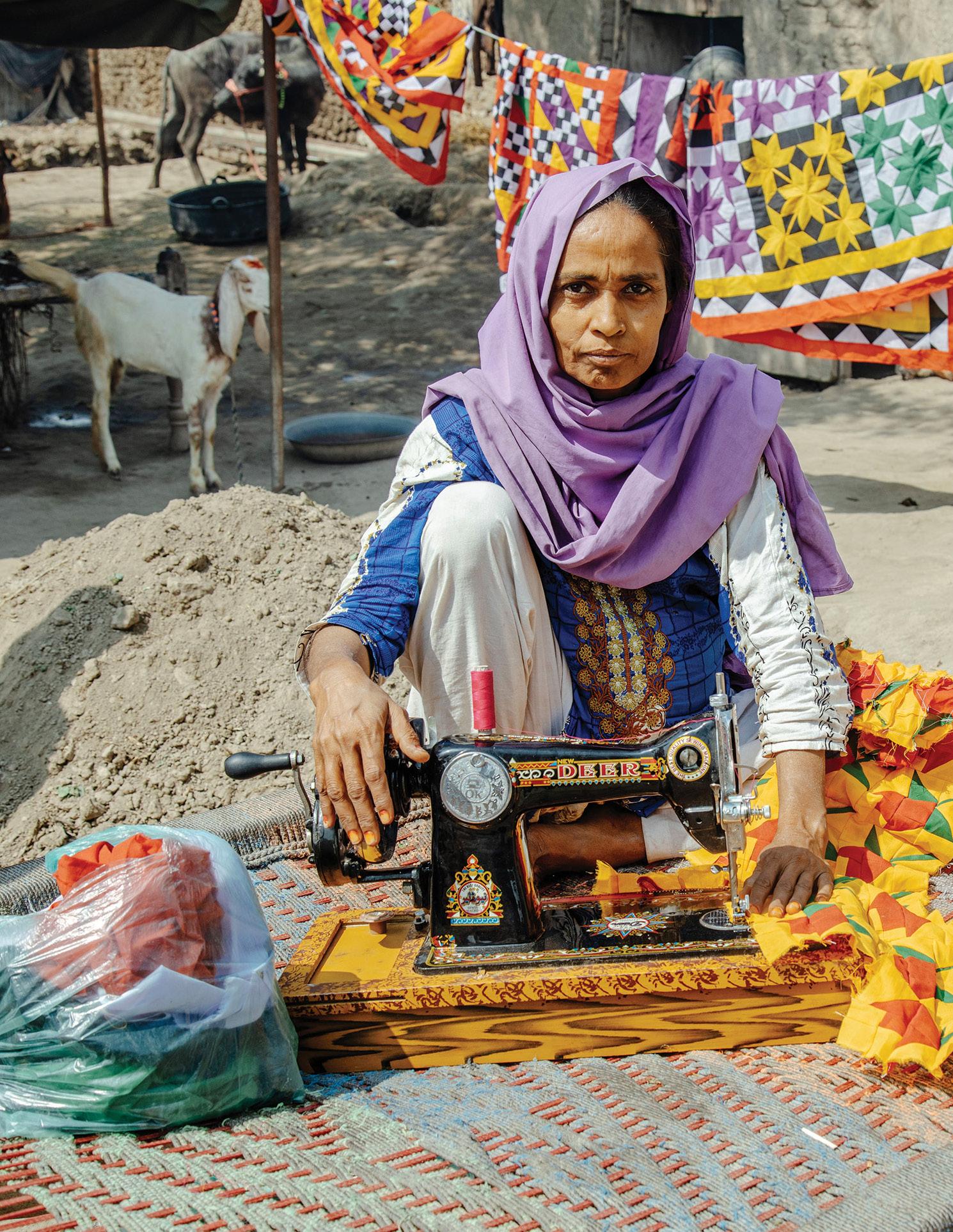
Small family businesses are the backbone of rural communities in Sindh – the poorest of the provinces worst affected by last year’s floods. Islamic Relief and the UNDP teamed up to provide cash grants of PKR 60,000 (around $220 USD) to enable 180 livestock keepers, flour millers, barbers, shopkeepers, tailors and seamstresses to get back on their feet.
The project focused on Khoundi, one of the poorest villages in Dadu district, which is home to 3,311 people. The village was selected by Islamic Relief following household surveys of the villages on a shortlist provided by the district administration. The targeting of grants was informed by close consultation with local people through specially formed community groups involving 255 villagers – 145 women and 110 men. The livestock grants alone supported the purchase of 209 goats, 17 sheep and five heifers for the families involved.
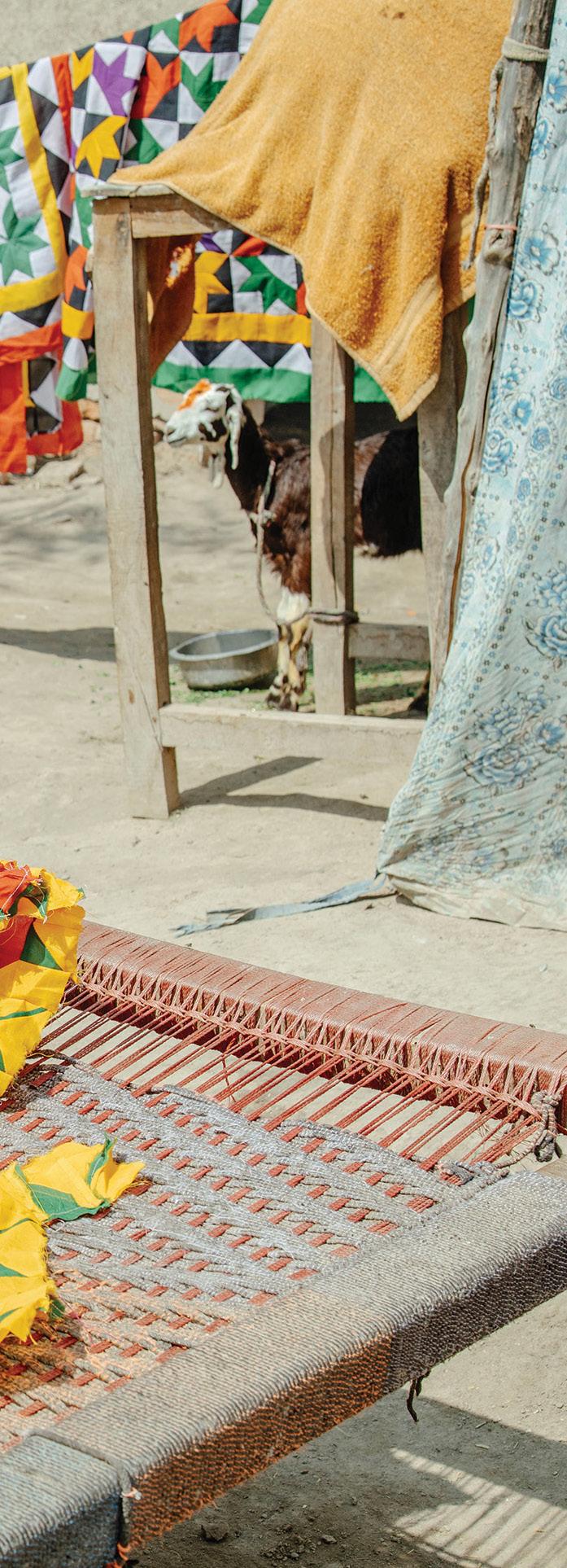
These small enterprise grants were part of a two-pronged approach to revitalize the village, alongside a PKR 22.5 million ($22,800 USD) cash-for-work programme to rebuild and strengthen flood-damaged infrastructure. Over 340 impoverished villagers, unemployed following the floods, were hired for around 15 days each to implement 25 rebuilding projects chosen by the community.
Between them, they restored 257 damaged houses, repaired 67 boundary walls, desilted three important irrigation channels, built 1,500 metres of raised brick-based pavements connecting parts of the village where mud pathways had been washed away, and raised the platforms of 15 community buildings to increase flood resilience. Eighty new latrines and ten new handpumps were also installed in the village as part of the project.
UNDP’s Crisis Prevention and Recovery Unit and Islamic Relief have a shared vision to ‘transform risk into resilience’ by building back better in relation to community infrastructure while also reducing poverty and vulnerability through livelihood and income generation. This is the kind of resilience building in just one village that is needed on a huge scale across Pakistan, underpinned by international climate finance and development funding.
“No words can describe the shock we are living through or how the face of the country lies transformed. For 40 days and 40 nights a biblical flood poured down on us, smashing centuries of weather records, challenging everything we knew about disaster, and how to manage it. Pakistan has never seen a starker and more devastating example of the impact of global warming. Life in Pakistan has changed forever”
Muhammad Shehbaz Sharif, Pakistani Prime MinisterEven with television showing villages submerged as far as the eye can see and satellite images revealing a third of the country under water, it is hard to fathom how devastating last year’s floods were from a human perspective.
Behind the mind-boggling numbers of people displaced, infrastructure wiped out, and livelihoods lost are countless human stories of hardship, resourcefulness and resilience. Millions continue to rely on humanitarian aid to survive, and some are now enduring a second successive monsoon exposed to the elements.
The communities affected are vulnerable not only because they are poor but also because their country and their communities are on the front line of the global climate emergency. It is a grave injustice that a country with such a small per-capita carbon footprint is paying such a heavy price for the enormous emissions of others.
Islamic Relief’s response to the floods was swift and farreaching, delivering lifesaving aid to 1.4 million people.
We were already raising the alarm and raising funds a month before the government declared a state of emergency on August 26, 2022. We have maintained a strong presence across Pakistan in recent years even when other aid agencies scaled their operations down, enabling us to act when disaster strikes.
But we could not have done any of this without your generous support!
Thank you for answering the call of the most vulnerable in their greatest hour of need. We’ve seen with our own eyes how their lives have been uplifted and transformed by what you give. Jazakum Allahu Khairan, for your continued support and kindness.

